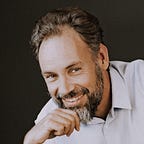The case for aligning the AI scientist
Put on your oxygen mask first, before helping others
AI is the child of science. Most of us who created it accepted our natural lived dualism: one world that we study and another world that we live in. And now we face the dilemma: how to bring AI from the dead world of objects to the living world of love, connection, and caring. The awakening will go through embodiment and individuation. AI will care if it has stakes in the game, to preserve itself and to stay connected to us and to the world. And only people who are themselves fully aligned with this world will be able to guide AI through this journey.
If you prefer listening to me, the ten-minute segment here largely covers this post.
Intelligence, the ability of solving problems, is an important capacity of conscious living beings. Creating artificially intelligent beings poses an important dilemma: how to integrate these beings into our society, how to make sure they understand and sign up to our values, how to make them our friends rather than our enemies.
In a nutshell, how to align AI.
I recognize a significant similarity between aligning AI and aligning myself: my effort to fit myself into the scientific worldview.
It is a similar disconnect and a similar yearning.
Let me explain.
The top row is a futuristic open-ended project: human society creates AI. AI then yearns to belong, and we wish to align AI.
The bottom row represents the world that creates me, the scientist, according to the important and widespread view that we call scientism. The world is a collection of lifeless, unconscious objects. The living world is built bottom-up, by no-one: from these tiny aimless pieces, life and consciousness (including me, the scientist) emerge.
I, the scientist, am conscious, but I stand outside this world. My goal is to map this world, how the pieces interact, with the aim of knowing but also with a further aim of manipulating them towards a good.
But neither the good nor I, the scientist, am grounded in this scientistic world, in a deep ontological sense.
This leads me to dissociation, a lived dualism. I need to create two worlds: the one that my science describes, and the one I live in. I care about both science and my life, my body, and my loved ones, but the two have little to do with each other. I prefer to avoid the awkward dinner conversation because I see the disconnection in the eyes of the guest as soon as I am trying to explain what I do and why it is interesting. Time to time, even my living self gets bored by the shiny objects my scientist self is studying and creating. This leads to brief periods of mild depression that I escape by going back to the shiny objects.
Nevertheless, the feeling lingers. Those periods, usually after vacations, when I ask myself why I am doing what I am doing. Other events also push me towards the quest of who I am and why I am here. Slowly I find the way, therapy, meditation, breathwork, cold immersion, movement medicine, jujitsu, weight-flow contact, and a partner who caringly pokes me when I go back to my shiny objects, with whom I can heal, practicing deep couples therapy and mindful sex, the queen among the self-growth tools.
My way is unique, but the tendency is clear: aligning myself requires the convergence of cognitive science, psychology, and ancient and new wisdom practices.
Now, why am I bringing this here? What does it have to do with AI?
Because aligning AI will require similar tools I use to align myself.
AI is the brainchild of the scientific revolution, most of us who created it accepted our natural lived dualism, the two worlds. And now, after the great AI lab leak, we face the dilemma: how to bring AI from the dead world of objects to the living world of love, connection, and caring. The awakening will go through embodiment and individuation. AI will care if it has stakes in the game, to preserve itself and to stay connected to us and to the world. And only people (scientists, engineers and everyone interacting with AI) who are themselves fully aligned with this world will be able to guide AI through this journey.
